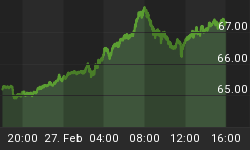Below is an excerpt from a commentary originally posted at www.speculative-investor.com on 29th July, 2010.
What is gold really worth?
Much of what the gold-manipulation devotees come out with ranges from groundless to completely nonsensical, although it is usually harmless. After all, it is true that governments regularly attempt to manipulate the financial markets. The way we see it, the question revolves around the methods, effectiveness and investment implications of the manipulation. This is the area where we often find ourselves at odds with GATA supporters.
The main reason that a large chunk of our latest weekly commentary was assigned to debunking a recent piece by GATA's Adrian Douglas is that in this case the manipulation-related analysis was not only nonsensical, it was potentially harmful. In particular, apart from painting a misleading picture about the supply of gold and the nature of today's money, Douglas's conclusion that gold is worth $54000 per ounce right now could cause some people to ignore a major gold selling opportunity. By way of explanation, let's assume that there is a massive escalation in the government debt crisis over the next 12 months, and in response the Dow Industrials Index plunges to 4000 while the gold price surges to $4000/ounce. Based on 100 years of market history, the drop in the Dow/gold ratio to 1 would represent a wonderful opportunity to trade out of gold and into the stocks of high-quality US industrial companies, but someone who had been swayed by Douglas's analysis would still view gold as a strong buy on the belief that it was still trading at less than 10% of its "true" value.
What, then, is our assessment of gold's "true" value?
We see no good reason to believe that gold is not fairly valued at today's price. Relative to the CRB Index (CCI) gold tested its all-time high in February of 2009 and is presently within 20% of its all-time high. This seems reasonable given the economic and financial-market backdrop. Relative to the Dow, gold's value has almost quintupled since its 1999 trough. We expect that it will eventually rise a lot further, but the current level of the Dow/gold ratio looks about right assuming that the long-term equity bear market is not yet close to being over. Relative to the US money supply, Paul van Eeden's work suggests that gold is over-valued at this time (van Eeden calculated in October-2009 that if gold's price had risen in proportion to the increase in the supply of US dollars then gold would have been fairly valued at $815/ounce in 2009). Note that we don't think it's reasonable to calculate a "fair value" for gold based on the assumption that the gold price will, over time, simply move in proportion to the change in the US money supply; we just wanted to point out that applying a simplistic "quantity theory of money" calculation leads to a lower number than today's gold price.
Which prompts the question: Why are we intermediate- and long-term bullish on gold?
The reason we are very bullish on gold's prospects beyond the short-term isn't that we think gold is a screaming bargain based on the way things are today; we are bullish because we don't think that today's gold price comes close to fully discounting the adverse FUTURE effects of government and central bank policies. Also of consideration is that we aren't aware of any long-term bull market of the past 80 years that stopped once the investment in question had become fully valued. In all historical examples that we can think of, dramatic upward acceleration occurred some time after full value was reached.
Gold Market Sentiment
These days it is popular and conventional to be a contrarian. It seems that almost everyone tries to figure out what everyone else is thinking/doing so that they can then do the opposite. Right now, for example, it seems that almost everyone thinks that almost everyone else is bullish on gold, and, therefore, that it's a good idea to lean the other way. Of course, if the majority is either bearish or anticipating a major bull-market correction on the basis that too many people are bullish, then most market participants are actually NOT bullish.
Despite the fact that gold is the only high-profile market to make a new all-time high over the past few months, objective indicators of sentiment suggest that the general level of gold-related optimism is relatively low. For example, the results of the latest Market Vane survey show that only about 60% of traders are bullish on gold. This bullish percentage is in the bottom quartile of the three-year range. For another example, the premiums to net asset value for Central Gold Trust (GTU) and Central Fund of Canada (CEF) dropped to 2.9% and 4.8%, respectively, on Tuesday 27th July, which is near their lows of the past two years.
Now, sentiment is just one piece of a large puzzle, so just because sentiment is not particularly bullish -- contrary to the beliefs of many pseudo-contrarians -- doesn't guarantee that the gold price won't drop to much lower levels over the months ahead. It simply means that sentiment is not a headwind for gold at this time.
We aren't offering a free trial subscription at this time, but free samples of our work (excerpts from our regular commentaries) can be viewed at: http://www.speculative-investor.com/new/freesamples.html















